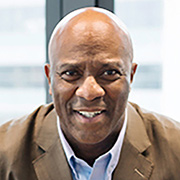
Sid Johnson
Vice President, Procurement and Automotive Sourcing
Education: MS, industrial management, Indiana Wesleyan University; BS, industrial engineering and technology, Central State University
Company Name: HARMAN International
Industry: Technology and Consumer Electronics
Company CEO: Michael Mauser
Company Headquarters Location: Stamford, Connecticut
Number of Employees: 30,000+
Your Location (if different from above): Novi, Michigan
Words you live by: Never sacrifice your value systems.
Who is your personal hero? My mother
What book are you reading? In Our Own Image: Treasured African-American Traditions, Journeys and Icons by Karen Pugh and Patrick H. Bass
What was your first job? I worked at my family’s dry cleaning business when I was young, but my first professional job in 1985 was with GE’s Aircraft Engines (now GE Aviation) business in 1988.
Favorite charity: Salvation Army
Interests: I love to golf. When I can get away, I really love to visit Arizona and hike Pinnacle Peak. I also read a lot.
Family: An amazing wife, son, and daughter.
Why You Need Both Mentors and Sponsors
My mentors were among the top two or three factors that had the most impact on my career. Early on, I realized that it was important to find someone, who had a similar background as myself or had a career that I admired, to guide me in my professional journey. But, there is one point I feel we don’t emphasize enough. There are two kinds of people you need in your career—a sponsor and a mentor.
A sponsor is a person that makes the tough calls on your behalf, and puts their trust and reputation on the line to help you grow your career, while advocating for your success. My sponsor, an African American leader, understood my ambitions, was instrumental in helping me gain clear professional goals, and supported me during some really critical points in my career, including advising and recommending me for a big promotion. In contrast, a mentor is someone who not only recognizes your strengths and weaknesses, but also imparts the hard lessons you need to do better. My own mentor put my skills through a stress test and prepared me for every kind of challenge, from going into my first day at a new job to taking on a strategic leadership role, where I was responsible for managing 60 percent of the costs of the company and overseeing a couple thousand employees. Their valuable counsel and investment in my professional growth helped to build my character and set me up for professional success.
These are the lessons I carry and impart to the individuals I sponsor and mentor today. I show them how they can succeed, while guiding them to reveal the best versions of themselves. But, I also try to impart the important lessons I’ve learned in my career and pass on the wisdom I gained from my own mentors. There is one lesson I always share, particularly when I’m guiding aspiring Black leaders—network outside your inner circle. That allows you to invest beyond your professional network and support the lives of young people who can contribute to the growth and success of their communities. I too have practiced this through my work with the Advisory Board at Michigan State University to prepare their supply chain curriculum so that it matches up with students’ needs once they join the workforce. And, it is also why I have been very involved with the National Minority Supplier Development Council, where I’ve served as vice-chair.
Mentorship is essential to guiding talented individuals, and presenting them with the invaluable insights and experiences to create a future generation of thoughtful leaders, who will always remember to serve in the interest of their businesses, industries and communities.






